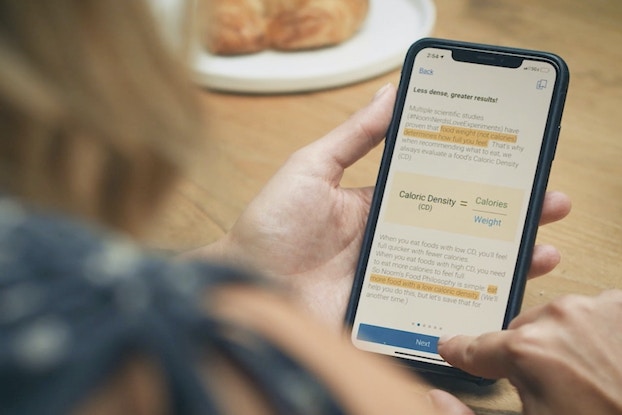
Key takeaways:
- Noom carved a niche in the crowded weight-loss market with a behavioral-science based program and full-time health coaches.
- The app taps into the pandemic-fueled wellness economy, which has ballooned into a $4.5 trillion global business.
- Now with $400 million in sales, Noom is targeting men, businesses and stress management for growth.
Madeline Pietschnig lost 20 pounds on weight-loss app Noom, but for the 27-year-old mother of two school-aged boys, that alone is not a victory.
She’s shed just as many pounds on other weight-loss programs, but the weight didn't stay off. And then her disappointment and disengagement kicked in, as did the self-blame and shame.
This time is different, she told CO—.
On Noom, “I have not only lost that weight, but I have maintained that weight loss — which is a first for me,” Pietschnig said. “Noom teaches the psychology behind our thoughts regarding weight loss and eating. It has rewired my entire way of thinking about weight loss and the everyday food choices I make.”
What’s more, “I have never been asked to remove any foods from my diet and I have never been shamed for my shortcomings,” she said.
Pietschnig signed up for Noom in 2020, when the app’s sales doubled to $400 million, from $200 million in 2019, wooing users with “psychology and human empathy enabled by tech,” Saeju Jeong, CEO and co-founder, told CO—. By design, Noom looks the culture of shame surrounding weight gain squarely in the eye and tells it to leave the room.
Via artificial intelligence and more than 3,000 full-time wellness coaches, the app delivers content developed by psychologists, nutritionists and behavioral health specialists aimed to change the eating habits of consumers — many who’ve borne the psychic toll of failed diets — long term, and from the inside out.
Indeed, psychology is the linchpin of Noom’s business model. That’s because “Noomers,” as they’re called, join the app with “a lot of emotional baggage regarding weight loss, and often immediate health issues whereby they need to lose weight,” he said. “Why is that? Because most of the available weight loss services unfortunately didn’t work for them over years.” So, they come feeling stigmatized and have internalized defeat, Jeong said.
“We understood that once we applied psychology and the power of human empathy with tech,” it bottled a path to healthy eating habits that are sustainable, too, he said.
Jeong is now leveraging this holistic mind-body-and-soul approach to the business of weight loss to drive growth this year as it courts men, 20% of users today, and builds its business-to-business arm, while tapping research and development to offer more robust stress and anxiety management solutions.
We were arrogant. I was blinded, thinking, ‘We have the best AI tech.’ AI tech? It’s freaking humans, empathy, love and passion. People need people. Humans need humans.
Saeju Jeong, CEO and co-founder, Noom
‘Health is the new luxury’
With an app subscription plan that tops out at $59 per month, Jeong says he’s on a mission to democratize healthcare for everyday folks who are increasingly taking wellness into their own hands. “People are seeking a healthy, high-quality lifestyle,” he said. “Health is the new luxury.”
He’s not wrong. The wellness economy has ballooned into a $4.5 trillion global business, fueled in part the proliferation of Noom’s digital startup brethren, which span telemedicine disruptors like Doctors on Demand to fitness phenom Peloton to therapy-geared apps like Talkspace.
The pandemic has only accelerated the trend, stoking the growth of holistic health and fitness coaching platforms like Noom, Vida Health and GOQii, according to a report from business intelligence firm CB Insights. They’re among the 70-plus health tech startups that raised a record $2.3 billion last year, catering to consumers who’ve formed new habits amid the pandemic by “capitalizing on the digital connections consumers are establishing through fitness equipment, wearables, apps, and more,” CB Insights reports.
Delivering ‘health care versus sick care’
Jeong, who is from South Korea and comes from a family of doctors, never set out to build a weight loss company. He wanted to create a far-reaching health management solution, and in this regard, Noom is a love letter to his father, who died at 51 when he was 21.
Jeong’s father was a celebrated physician in the country, but to Dr. Jeong, that renown felt somewhat hollow. Throughout a medical career treating patients with chronic conditions like diabetes and high blood pressure, Dr. Jeong never got a chance to prevent those very conditions via healthy eating and regular exercise. For the doctor, that left a patient-care wish unfulfilled, like work undone, Jeong said.
“He told me before he passed away, ‘All I did, son, from morning to night, was take care of sick people,’” he recalled. “‘I became a sick-care pro, not a healthcare pro.’ My father felt bad about that gap,” he said. “That’s the reason why I started Noom.”
‘We struggled so many years’ — then an ‘a-ha’ moment
Noom is far from an overnight success story, but instead a 13-year-long tale of trial and error marked by now-shuttered apps. “We struggled so many years to build the business,” Jeong said.
In 2008, Jeong launched fitness activity tracker CardioTrainer followed by Calorific in 2010, a color-coded calorie-counting app. Both failed to meet Jeong’s mission to build an affordable and scalable healthcare solution that would make the most impact on the greatest number of people.
Then came his first “a-ha” moment. “Losing just 5% of one’s body weight is a priceless gift that will immediately impact your sugar level, blood pressure and brain function,” Jeong realized then, citing CDC research.
When he zeroed in on weight management as the most efficient way to deliver health to the masses and tackle chronic conditions, “the gateway to total health,” that’s when Noom started to take shape.
The first iteration of Noom launched in 2011, bringing to market a digital weight-management tool powered by content steeped in psychological therapy and cognitive behavioral therapy (CBT) to help users meet physical and mental health goals by changing their habits for good. Artificial intelligence supercharged the app, as virtual AI robots coached users on their Noom weight-loss journeys.
But it still wasn’t enough. The tool alone did not get consumers to change their eating habits, so he shut it down.
“We were arrogant,” Jeong said. “I was blinded, thinking, ‘We have the best AI tech.’” Turns out, the app was missing the magic ingredient: the human touch. “AI tech? It’s freaking humans, empathy, love and passion. People need people. Humans need humans.”
So, in 2017, Noom relaunched, replacing robots with full-time, certified human coaches, now the beating heart of its business, and the app took off. “People loved it,” Jeong said. “It was the right product/market fit.”

A behavior-science platform staffed by on-demand human coaches
Today Noom, which Jeong calls a behavioral science platform, is equal parts psychology, technology and group therapy, with a curriculum based on CBT, but also disciplines like mindfulness-based stress reduction (MBSR.)
He touts the app’s science- and peer-reviewed, evidenced-based approach to holistic health and weight loss as its differentiating sweet spot in the market.
For one, Noom is accredited by the National Consortium for Credentialing Health & Wellness Coaches (NCCHWC). And its credentialed coaches all hold at least four-year and more advanced degrees in health-and-wellness-related disciplines.
Via instant messaging, coaches foster a one-on-one relationship with Noomers, offering on-demand guidance, support and accountability, as the app allows the coach to see a user’s meal and activity logs.
(Jeong stressed that Noomers set the tone of that interaction, helped by AI technology, which personalizes the user experience based on their preferences and behavior patterns.)
When asked about the proprietary psychological model underlying what Noom calls its “curriculum,” Andreas Michaelidies, chief psychology officer, said the platform’s Noomiversity training program “prepares coaches to facilitate empirically validated, substantial behavior change.” Said another way, the program pinpoints the “behavior chains” behind users’ existing habits and the source of their struggles, so that they can reverse course to make positive pivots, he said.
Noomers are schooled in nutrition and healthy eating via a green, yellow and red color system of low- to high-caloric density foods, and are sent daily quizzes and articles like, “Introduction to the Psychology of Weight Loss,” “What Type of Eater Are You?” and “The Only Seven Habits You Need,” shepherding them through courses that advance one from a “Noom novice” to a “Noom master.”
Users on like-minded health journeys join coach-led peer groups, where chats ensue on topics from healthy treats for a virtual tailgate party to daily and weekly inspirational nuggets and challenges, like, “What can you do this weekend to serve your wellness needs?”
Personalization is another part of the equation, as Noom leverages AI to monitor every user session, so that the program is customized to an individual’s eating, lifestyle and even thinking patterns, albeit anonymously.
Noom says 64% of users on the program lose over 5% of their body weight, and 60% keep the weight off for over a year.
While Jeong would not comment on competitive programs, WW, formerly known as Weight Watchers, has reported that 25% of its users kept off at least 5% weight loss for 12 months.
“I think Noom is working because our approach is very organic — we’re not giving them any fad diet or system, instead helping them to understand the psychology” behind their choices — which means that Noom is not a quick fix when it comes to weight loss: Achieving sustainable, healthy outcomes typically takes time, he said.
Growth pillars: Male consumers, businesses and stress management
It’s a point of pride for Jeong that Noom has been cash-flow positive for over a year, as many hyper-growth startups are not, he said.
To drive further growth this year, the app is placing a big emphasis on research and development to roll out new stress and anxiety management solutions this year, which two-thirds of Noomers have expressly asked for, Michaelidies said.
Men are another (underserved) growth target. “In the male market, they don’t talk about losing weight, they talk about building muscle,” Jeong said, “yet many men face pressing health issues.”
The company is also angling for a bigger slice of the B2B market and is expanding its preventative-care platform to employers and healthcare providers that will offer Noom as a reimbursed benefit.
Jeong, who notes that Noom’s diabetes prevention program was the first of its kind to be recognized by the CDC, sees this as one way to broaden its reach and lower folks’ risk of future illnesses. By changing behavior, “we want to help many, many lives,” Jeong said. Which is just what his father wanted.
CO— aims to bring you inspiration from leading respected experts. However, before making any business decision, you should consult a professional who can advise you based on your individual situation.
Follow us on Instagram for more expert tips & business owners stories.
CO—is committed to helping you start, run and grow your small business. Learn more about the benefits of small business membership in the U.S. Chamber of Commerce, here.
CO— Exclusives: Insider Strategies
How the buzziest brands and hottest startups are solving today's biggest business challenges. CO— brings you advice from startup founders and top executives for thriving in a new world.








